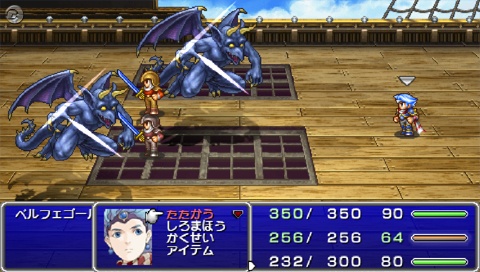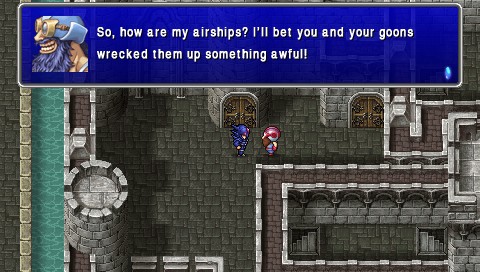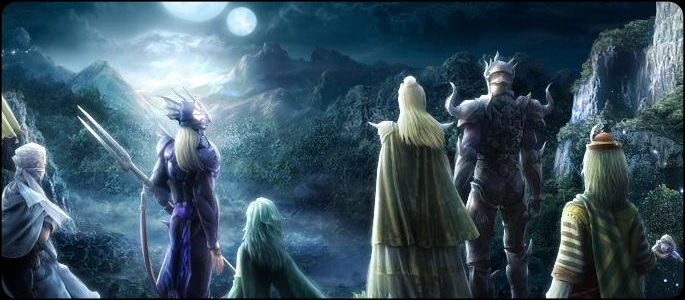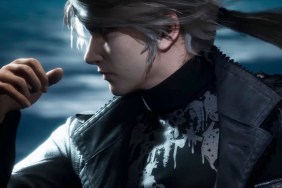Final Fantasy IV: The Complete Collection lives up to its name, containing Final Fantasy IV in its standalone form, but also packing in its direct sequel, Final Fantasy IV: The After Years, which takes place 20 years after the original game’s ending. This sequel was previously released only on Japanese cellphones and then later translated and ported to Wiiware, available only as downloadable chapters. All chapters put together, The After Years costs close to 40 bucks on Wii. Now to reiterate, those Wii and mobile versions are sold without the original FFIV. So at the retail price of $30, the PSP’s Final Fantasy IV: The Complete Collection is already a good value. But then add in the PSP-exclusive bonus episode and graphical touch-ups, then you’ve got something really special.
The bonus “Interlude,” found only in the PSP version, links the original game to The After Years more closely. It’s not going to blow your mind or anything, but as an extra, it does its job well. You’re looking at about 2-6 hours of gameplay for this mid-quel, most of it being pretty linear. The main purpose is to tell an extra little bit of story and give nostalgic players what they really want, which is more time with the characters they love, in the world they’ve come to treasure. It serves this end quite well and provides a nice touch of difficulty at times, too, despite the use of a few recycled dungeons and bosses. Pessimists will probably view the Interlude as being too tacked on, but hey, emotions rule this world more than anyone will admit, and the emotions I felt while having fun in a sort-of new adventure with the main characters of one of the most beloved RPGs of all time were only positive. I know critically there was not a tremendous amount of development time that went into the Interlude, but that doesn’t matter because it was fun and interesting.

Final Fantasy IV: The After Years is a surprisingly good sequel, considering it began as an episodic cellphone game. Except for the PSP-exclusive CG intro video, it follows the visual style and gameplay of the remade original game, which obviously means that the DS battle additions are not found. What has been added is the “Bands” attack system, which allows players to string together special combos to do extra damage; they’ll need it in some of this sequel’s tougher areas, for sure. A new thing players must keep track of is the cycle of the moon. Depending on what phase the moon is in, characters’ abilities will be under various effects that’ll impact one’s abilities, and strengths. Keeping an eye on the moon is something one will have to get used to. Unlike Interlude, The After Years does actually allow some exploration, pleasing genre traditionalists.
My guess is that a lot of long-time FFIV fans will play this out of order, going for Interlude first, followed by The After Years; then, having their cockles freshly warmed, go back to FFIV and enjoy the old anew. I recommend this course of action for those on the fence about getting the game.
Should you buy Final Fantasy IV: The Complete Collection? For the nostalgic, my answer would absolutely be in the affirmative. If you played this game and liked it — any version at any time — and don’t mind playing the “same game” with touched up visuals, then yeah, it’s a no-brainer. (Nostalgia is heightened by going in the order prescribed above.) But the great thing is, FF4:TCC is much more than that, as most fans have still not played the solid sequel.

Over the last 20 years, a lot of the plot devices in FFIV have definitely become cliché and will certainly be hitting the player as such. It’s kinda tough to criticize it because the game was doing this stuff before most games were, though justifications like that can’t alter the feelings in your gut when they happen. The nostalgic will see it and smile, while first timers, well…depends on your mindset going into it. If playing FFIV for the first time, it’s best to see it as an object in the Big RPG History Museum, right at the beginning of the 16-bit era.
Charming as the game was, is, and always will be, it’s not without its annoyances. Every time I go back to an older RPG, I chuckle and say “Ah hyuck hyuck hycuk, yup, I’m ready for battles every three steps!” And then I play it, realize I was not exaggerating, and within an hour I get frustrated all over again. I held those shoulder buttons to run from battle more during this FF4:TCC play than in any other JRPG I can remember. The first time that I won a battle, only to have another one occur on literally the next step, I thought “Well I’ll have to mention that this happened once in my upcoming review.” Oh, if only it was limited to once or twice….
Random battles, or at least some sort of combat system, have long been a staple of RPGs and probably always will be, but there are just way too many of them in FFIV. By today’s standards, it is a little lacking in that area and will likely annoy genre neophytes. At least the fighting system itself has stayed fun — if basic — after all these years.
The graphics of the DS remake looked nice, but something felt off. If a 20-year-old game is going to go 3D, then in my opinion it ought to go all out and do it right, not come out newer only to look like something two generations old. The best way to do things with Final Fantasy IV was therefore to maintain the classic 2D look with some refreshed sprites and animations, which the Complete Collection nails. This is the best that Final Fantasy IV has ever looked, hands-down. Going through the game is a pleasure for fans of the source material or those that simply love RPGs in general.

Music in FF4:TCC is the same great stuff as it’s always been — one of Nobuo Uematsu’s finest works, especially coming in an age when video game music wasn’t generally on the level that it is today. It’s been arranged and presented in a way that stays true to the original while giving it a timely update. However, if older players really want their heart-strings plucked, the config menu offers the ability to switch to the original sound version. The After Years contains some new tracks which are nice, but mixed with the sweeping, classic, memorable tunes of Final Fantasy IV, they don’t quite fit in so well. They’d be fine for an indie RPG or low-budget title, but mixed in with such a legendary soundtrack, it seems out of place. That’s like that one house you go to at Halloween, where you get a variety bag and you’re like “Aw yeah,” and it’s got all these Reese’s Cups and Nerds and then you spot the Good-N-Plenty and you’re like “The hell is that doing in there?” The only satisfaction you’re getting out of that thing is the “swish” when you shoot an imaginary three-pointer into your trash can. But Halloween’s worst treat shouldn’t smear my complimenting of the soundtrack that is truly Final Fantasy‘s Twix bar.
Final Fantasy IV is a game that has been remade like 5,000 times. If you bought new copies of every version that has been released in North America plus the Wiiware sequel, you have spent over $200 on this game, even without the PSP version. That is definitely something to consider: whether or not this is worth stacking 30 more bones on that heap.
Thing is, The Complete Collection for PSP, truly, is the best and most definitive way to play the game. In addition to its bundling of the full game and every episode of its direct sequel, plus the exclusive interlude that ties them together, it has the graphics that best capture the essence of the 16-bit classic, a translation that serves the story well (mostly the same as previous portable versions), and everything else that has kept this game among the most beloved RPGs of all time for the last two decades. Now then, this game is getting a great review and high score at the end because it’s a fantastic game available at a good value, bundled with a sequel and some new content, making it finally a complete, definitive version. At the same time, enough is quite enough, and if this game is to be remade again, anything short of a 3D, high-def, mid-life PlayStation 5 title with hours more gameplay and new dungeons will be seen as lame, unforgivable exploitation. Till then, hey, this is wonderful.
PlayStation LifeStyle’s Final Score
+ Full original game w/touchups + interlude + sequel = unbelievable value. +/- You might have played this game before…perhaps several times. |
 |
–








